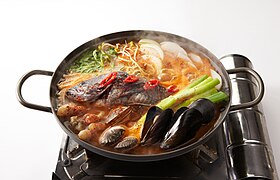Maeun-tang
This article needs additional citations for verification. (February 2013) |
 | |
| Alternative names | Spicy fish stew |
|---|---|
| Type | Tang |
| Place of origin | Korea |
| Main ingredients | Fish |
| Ingredients generally used | Meat, vegetables, tofu, gochujang |
| Korean name | |
| Hangul | 매운탕 |
|---|---|
| Hanja | --湯 |
| Revised Romanization | maeun-tang |
| McCune–Reischauer | maeun-t'ang |
| IPA | [mɛ̝.un.tʰaŋ] |
Maeun-tang[1] (매운탕) or spicy fish stew[1] is a hot spicy Korean cuisine fish soup boiled with gochujang (Korean red chili pepper paste), '고춧가루'(chili powder), and various vegetables.[2] The name is a combination of two words: '매운', which derives from '맵다', meaning "hot and spicy"; and '탕(湯)', meaning "soup". As its main ingredient, fresh or saltwater fish is cut into several pieces and boiled with green vegetables such as watercress and garland chrysanthemum. Onion, radish, chilis, crown daisy, garlic, and sometimes zucchini and bean curd are added to the mixture to absorb the chili pepper paste which is the main flavoring of this dish. It is then seasoned with chili powder, garlic, soy sauce, and additional gochujang may be added once more to taste.
Restaurants that offer this dish often allow customers to select their fish from an aquarium. Many specialty seafood restaurants have several aquariums from which to choose. Popular fish for this dish may include red snapper, sea bass, yellow corvina, codfish, croaker, pollock, and even freshwater fish like carp and trout. In addition, other shellfish such as crabs, clams, and oysters can be also added to this soup to complement and enhance its spicy yet refreshing flavors.
This soup is one of Korea's most popular dishes while drinking soju. If ordered with hoe at a restaurant, the soup is often then made from the leftover parts of the fish.
Gallery[]

maeuntang ingredients

maeuntang
See also[]
References[]
- ^ a b (in Korean) "주요 한식명(200개) 로마자 표기 및 번역(영, 중, 일) 표준안" [Standardized Romanizations and Translations (English, Chinese, and Japanese) of (200) Major Korean Dishes] (PDF). National Institute of Korean Language. 2014-07-30. Retrieved 2017-02-16.
- 주요 한식명 로마자 표기 및 표준 번역 확정안 공지. National Institute of Korean Language (Press release) (in Korean). 2014-05-02.
- ^ 매운탕 Archived 2011-06-10 at the Wayback Machine Nate/ Encyclopedia of Korean Culture (in Korean)
External links[]
| Wikimedia Commons has media related to Maeuntang. |
- Korean soups and stews
- Seafood dishes
- Spicy foods
- Fish stews

